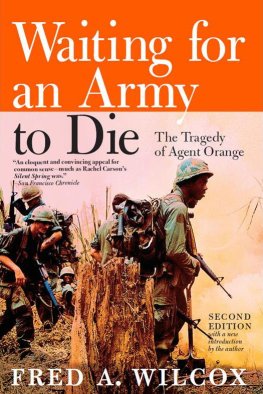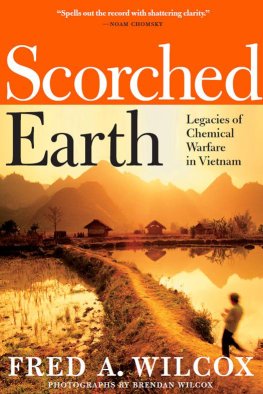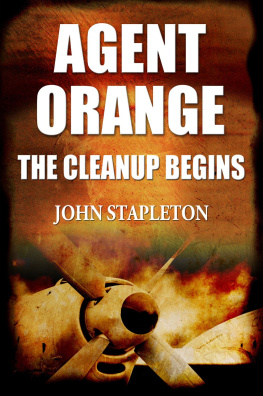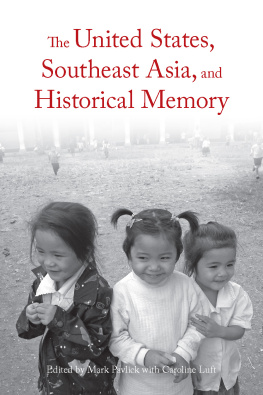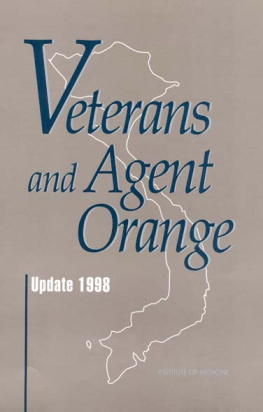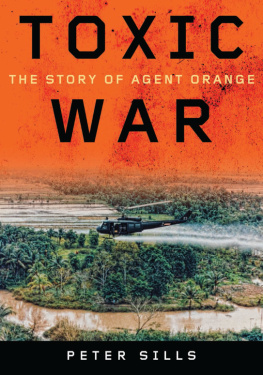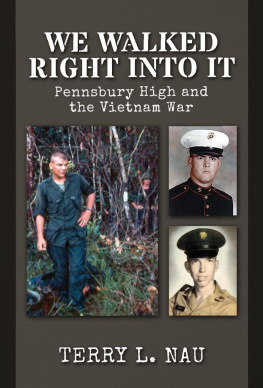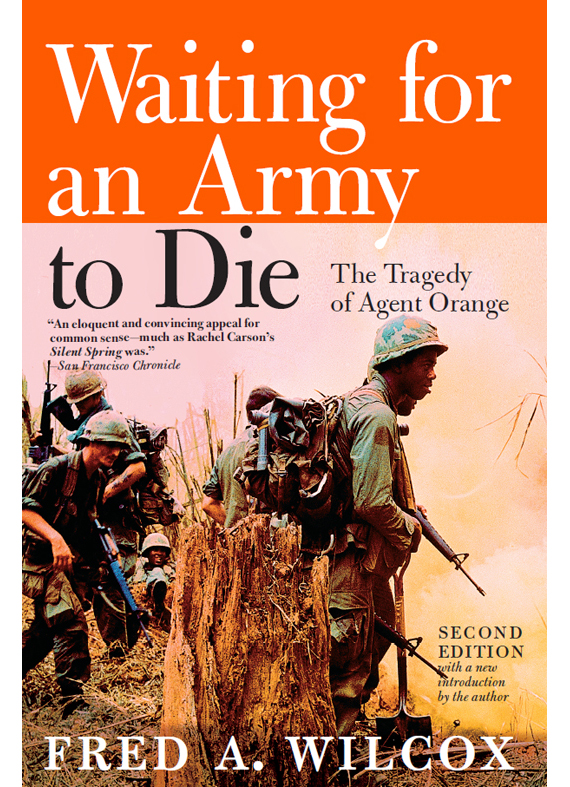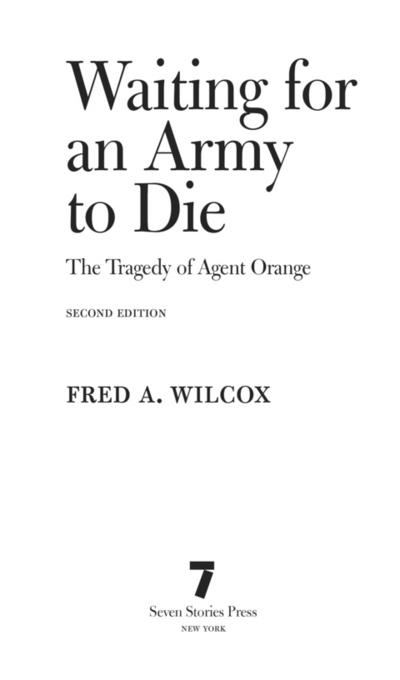Copyright 1989, 2011 by Fred A. Wilcox
First Seven Stories Press edition, August 2011
Second Edition
All rights reserved. No part of this book may be reproduced, stored in a retrieval system, or transmitted in any form or by any means, including mechanical, electric, photocopying, recording, or otherwise, without the prior written permission of the publisher.
Seven Stories Press
140 Watts Street
New York, NY 10013
www.sevenstories.com
College professors may order examination copies of Seven Stories Press titles for a free six-month trial period. To order, visit http://www.sevenstories.com/textbook or send a fax on school letterhead to (212) 226-1411.
Library of Congress Cataloging-in-Publication Data
Wilcox, Fred A.
Waiting for an army to die : the tragedy of Agent Orange / Fred A. Wilcox. 1st Seven Stories ed.
p. cm.
eISBN: 978-1-60980-339-1
1. VeteransDiseasesUnited States. 2. Agent OrangeWar use. 3. Agent OrangeToxicology. 4. Vietnam War, 1961-1975Chemical warfare. I. Title. II. Title: Tragedy of Agent Orange.
UB 369. W 54 2011
363.1791dc23
2011023266
v3.1
I wish to dedicate this book to Paul Sutton, Ken Herrmann, to Jerry, Lori, Sandy, and Heather Strait, and to all of those who have suffered, and continue to suffer, from the effects of Agent Orange/chemical warfare.
CONTENTS
PREFACE
In writing about Agent Orange, I do not wish to create yet another stereotype of Vietnam veterans. More than one hundred thousand veterans have undergone the Veteran Administrations Agent Orange examination while thousands more have applied for service-connected disability due to their exposure to Agent Orange. But this does not mean that all veterans are sick, dying, or have fathered children with birth defects. When I use the term veteran, I am referring specifically to those men and women who served in Vietnam and who believe they were exposed to toxic chemicals. Some veterans are bitter at having served in a war they consider a waste, while others would willingly return to Southeast Asia if called upon by their government (the majority of men who served in Vietnam volunteered for duty there). And just as there is no unanimity among veterans about the war, they often disagree on how best to go about convincing the government to take their complaints seriously. Regardless of how they feel about Vietnam, and in spite of their political differences, all of the veterans with whom I spoke share a common desire: They wish to see those veterans who are too sick to work or who are dying from cancer compensated for their illnesses, and they want the VA to show good faith regarding the health and welfare of Vietnam veterans.
I wish to thank John and Deborah Green for providing me with valuable research material and moral support; Andy Wilkinson, Joe Cole, Dave Martin, Frank Richetti, Jerry Strait, Wayne Wilson, Paul Sutton; and all of the men and women who have refused to be defeated by government stonewalling, bureaucratic shell games, and the contempt of multinational corporations. I also wish to thank the courageous, tough, and extraordinarily loving women who have fought side by side with their husbands, lovers, brothers, or friends on this issue. The mothers who care for the Agent Orange children, the wives who try to ease their husbands pain, widows who have refused to give in to bitterness or despair, and the grieving parents of young men who succumbed to cancer and other Agent Orange induced illnesses should also be remembered. All of you have been a source of inspiration to me and to countless others. I thank you. I salute you.
INTRODUCTION
On June 8, 1969, President Nixon appears on television to make an important announcement. During his presidential campaign, Nixon pledged to end the war and win the peace. Perhaps hes going to reveal just how he plans to do that. Instead, he tells a bitterly divided nation that he will bring 25,000 soldiers home from Vietnam, reducing troop strength to 484,000 by December 15th.
Twelve thousand miles away, American soldiers cluster around a transistor radio, waiting to hear which units will be withdrawn from the war zone. The men, many of them just out of their teens, seem to be holding their breath. Will they continue fighting in the rice paddies and jungles of Southeast Asia, or will they turn in their weapons, pack their rucksacks, and board a freedom bird back to the world.
Among the troops to be pulled out, announces Armed Forces radio, is the 3rd Brigade of the 82nd Airborne. Cheering, hugging, dancing, they hoist a small Vietnamese boy, parading him about as though hed set them free from the killing fields. They have survived firefights and ambushes, death and destruction. Some have been wounded; all bear the scars of war.
These soldiers have no way of knowing they have been exposed to carcinogenic, fetus deforming, and possibly mutagenic chemicals during their twelve-month tour of duty. In the field, they were told that their skin rashes were jungle rot, their headaches, dizziness, and stomach upsets were symptoms of combat stress. They watched C-123 aircraft fly low over mangrove forests and triple canopy jungles, spewing chemicals that turned the trees into lifeless wastelands in a matter of days. Inside these defoliated zones they found dead birds and monkeys, fish floating upon the surface of streams, a deep, frightening, silence.
Killing the trees, said the military, would drive the Viet Cong and North Vietnamese soldiers into the open, where superior American firepower could destroy them. The defoliation campaign was bound to shorten the war, and it would save American lives. In time, the jungles would grow back, the tigers, elephants and bears would return, and toxic chemicals in the soil would degrade in sunlight or be washed out to sea during monsoon rains.
Had anyone predicted that millions of human beings exposed to Agent Orange/dioxin would get sick and die, their warnings would have been dismissed as sci-fi fantasy or apocalyptic nonsense. Unfortunately, forty years after the last spray mission in Vietnam, American, South Korean, Australian, New Zealand and Vietnamese soldiers, as well as the Vietnamese people, are suffering and dying from the effects of chemical warfare.
When I first set out in early 1980 to write a book about a chemical called Agent Orange, few people really wanted to talk about the Vietnam war. It was as though the curtain had fallen on a production that drew huge crowds for many years. People argued and fought over the meaning of this production. They hurled accusations and threats, walked out on their families, divorced their spouses, and went into exile. Then, one day in April 1975 it was over. Fifty-eight thousand Americans and several million Vietnamese were dead. This toll did not include those who had died or would die from the effects of chemical warfare.
One blustery winter night, I joined John Green, an army medic in Vietnam, and his wife Deborah for dinner. Over wine and cheese, they told me about their work with Agent Orange Victims International, an organization founded by Paul Rheutershan, a helicopter crew chief who flew almost daily through clouds of herbicides being discharged from C-123 cargo planes. Paul observed the dark swaths cut into the jungle by the spraying, watched the mangrove forests turn brown, sicken and die, but didnt really worry about his own health. According to the US Army, Agent Orange was relatively nontoxic to humans and animals.


